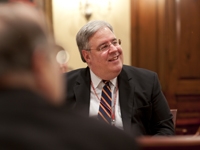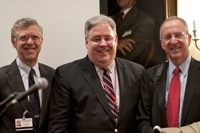Dr. David Skorton hardly defines himself by what many would consider his primary occupation: president of Cornell University. During lectures and speeches, he'll talk at length about his professorship in internal medicine and pediatrics, his board certification in cardiology, even his failed attempts at becoming a jazz musician or a stint selling women's shoes while an undergrad at Northwestern University — until it becomes clear that all that Dr. Skorton has done up to this point is just as critical to him as the influential post he now holds.

Cornell University President Dr. David Skorton speaking on "The Two Cultures," March 19.
Dr. Skorton's career path, like many faculty members and administrators at Weill Cornell Medical College, has bridged several different academic and cultural disciplines.
Taking the view of one deeply engaged in not only life sciences, but social sciences and the humanities as well, Dr. Skorton was at Weill Cornell on Thursday, March 19, to discuss science, ethics and society as they pertain to C.P. Snow's landmark lecture "The Two Cultures."
In 1959, Snow, a British scientist and novelist, delivered his lecture, which posited that a lack of communication between the cultures of the sciences and the humanities presented an obstacle in solving many of the world's problems.
To celebrate the 50th anniversary of Snow's lecture, which later became a book, Weill Cornell's Division of Medical Ethics in the Departments of Public Health and Medicine has over the past few months invited a number of speakers from varied academic and professional backgrounds to discuss Snow's thesis and how it has evolved in the half century.

Dr. Joseph Fins
"All of our guests have spanned all kinds of disciplines and traditional boundaries of knowledge and scholarship," said Dr. Joseph Fins, chief of the Division of Medical Ethics at Weill Cornell Medical College. "To celebrate the 50th anniversary of this seminal publication and its relevance to bioethics and its particular disciplines, we will consider the relevance of the two-culture divide to medicine, the history of science, philosophy, theology, the media, public policy and the law."
Other scholars and writers, including Snow himself, indicated that the passage of time had done much to, if not eradiate the gulf between the two cultures, at least draw them closer together.
"C.P. Snow's book was one that I and many of you read a long time past," Dr. Skorton said. "Much has changed in the last 50 years since he analyzed society and found science and humanities utterly separate and almost incapable of communicating with each other. Today, were he with us, he might have to acknowledge that there are three cultures — the sciences on one hand, humanities cast on the other side, and the social sciences somewhere else."
The world outside of science and the humanities has also changed drastically since Snow's day.

(From left) Department of Public Health Chairman Dr. Alvin Mushlin, Dr. Fins and Dr. Skorton
"Another issue that is a countervailing force against Snow's construct is the fact that the so called general public, of which I consider myself a card-carrying member, is potentially much more informed about a very broad variety of issues," Dr. Skorton said. "For example, my background is as a failed musician, but I am beginning to understand a lot more about the world of finance and accounting and sales of taxable debt than I ever thought I would."
Whether Snow's two cultures have indeed reconciled to each other to some degree, or the advent of a third "social sciences" culture has created the illusion of a narrowing division, Dr. Skorton stressed that in today's world, where the science of stem cell research must confront the ethics and morality of an American public that is hardly in accord on the issue, the need for bridges connecting these cultures has never been greater.
"We must find our way through the lack of consensus with regards to both medical ethics and our own professional code of ethics," he said.
Photography by Amelia Panico.

